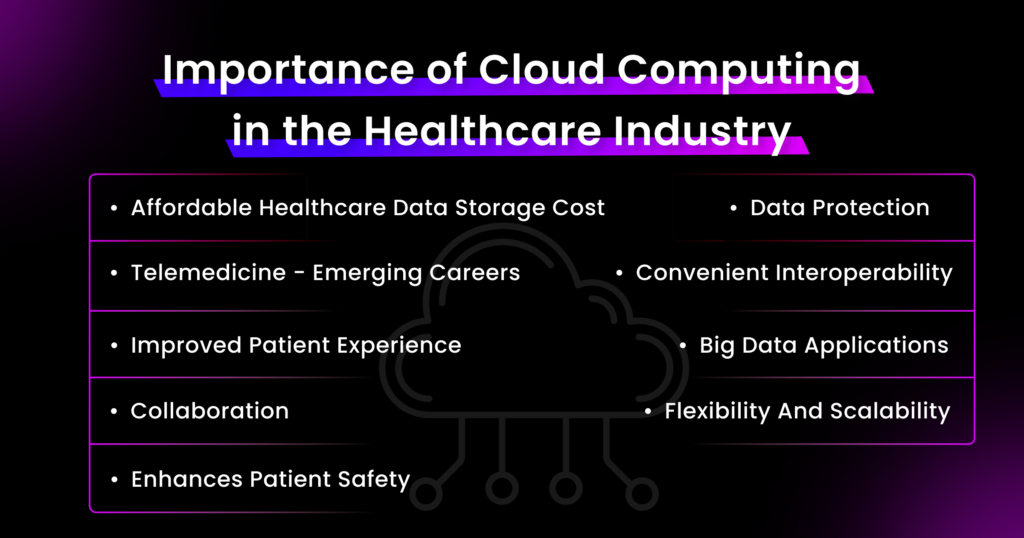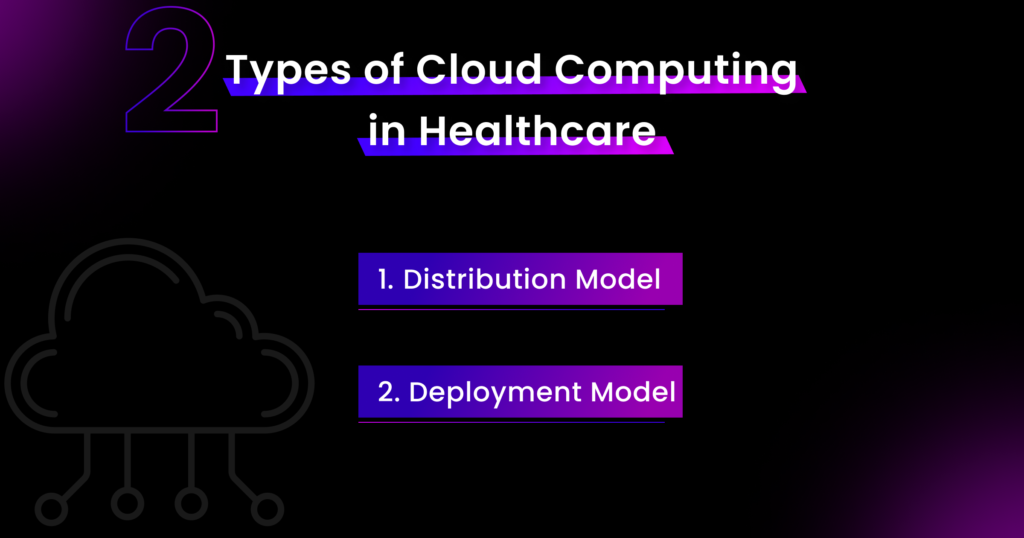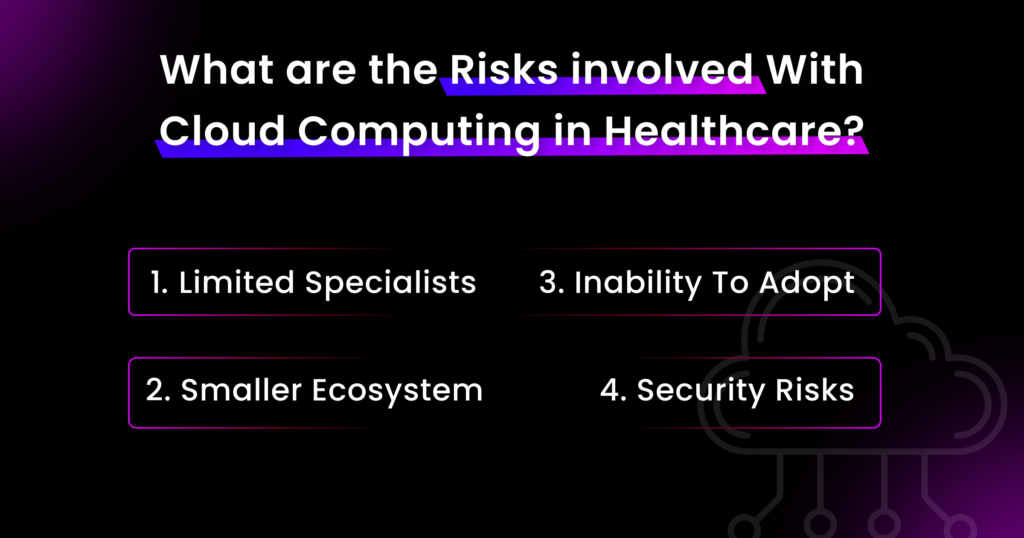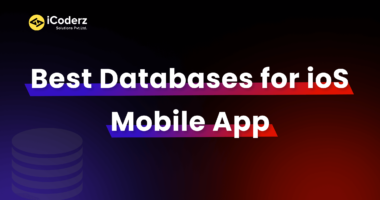Table of Contents
The healthcare industry is one of the most important sectors in any economy, and it relies heavily on technology. And today, the cloud computing is the best solution for managing a large amount of data, providing users with remote access to their workstations, and making a healthcare organization more efficient and profitable. In this article, we will explore how cloud computing can help a health organization to improve patient care, save time and money in admin tasks, and reduce costs in IT management.
Global Markets Insight predicts that by 2025 the healthcare cloud computing market will be worth $55 billion
Organizations today are increasingly turning to cloud technology, due to its sophisticated capabilities like collaboration and efficiency. The benefits of Cloud Computing in healthcare have increased over time thanks to HIPAA compliance and remote patient care.
For healthcare organizations these days, quality is the cornerstone of success. Cloud Computing Technology isn’t just an innovative choice for modern tech professionals; it’s a requirement. From increasing operational and infrastructural costs to strict government compliance, you’ll need all the support you can get. You can get those essentials from cloud computing technologies. This blog post will explore how cloud computing solutions are definitely worth their weight in gold in the healthcare industry.
What is Cloud Computing in Healthcare?
Cloud computing in healthcare is the use of remote servers to store, manage, and process data. The cloud allows for more flexibility and scalability than traditional on-premises systems, making it a popular choice for businesses in a variety of industries.
Healthcare organizations are increasingly turning to cloud solutions to improve patient care, reduce costs, and increase efficiency. Cloud-based electronic health records (EHRs) are becoming more commonplace, as they offer significant advantages over legacy systems. In addition, many hospitals and clinics are using cloud-based telemedicine solutions to improve access to care.
Perhaps most importantly, the cloud can help healthcare organizations improve patient care while reducing costs. In addition, the cloud offers greater flexibility and scalability than on-premises solutions, making it easier for organizations to keep up with changing demands.
The Importance of Cloud Computing in Healthcare Industry

1. Affordable Healthcare Data Storage Cost
Some big hospitals have plenty of space to store patient records, but that’s not always the case for smaller hospitals and clinics. Thankfully, Trove guarantees affordable storage so that all healthcare data is safe and available when needed.
These include lab tests, insurance claims, and prescriptions. Cloud computing can help healthcare providers handle this huge amount of data efficiently. When cloud computing and online data storage offers more storage capacity, cloud-based analytical tools can put that data to use in meaningful ways.
2. Telemedicine – Emerging Careers
Cloud computing has revolutionized the way healthcare is delivered, especially through telemedicine. Cloud-based apps and telehealth systems have helped optimize the medical field by making patient health insurance readily available to those in need, during treatment, recovery, and prevention. In addition to this, these systems help share healthcare data between care providers.
In addition, many apps have features that are designed to help you better monitor your health. With virtual analysis of Online Medicine Delivery App Development consumption and video conferencing with doctors, cloud computing is the key to enhanced medical care via telemedicine.
3. Improved Patient Experience
Doctors can enhance their connection with patients by providing access to lab test reports, medical records, and doctor’s notes. This information will help patients maintain their health with more knowledge.
Along with cloud computing in healthcare, patients have been avoiding unnecessary tests and prescriptions.
4. Collaboration
Due to the EMR in the cloud, patients can access their medical records when they visit a doctor. This improves collaboration and is safer for everyone involved.
Doctors can share data, review consultations from other healthcare professionals and share data. This improves the quality of care for your doctors, so you’ll be cared for by a doctor who is experienced with your condition. You also save time because you don’t need to travel between different offices to get what you need.
5. Convenient Interoperability
Website content can now be changed easily and on the go, thanks to HTML5 and CSS3. This means an instant update, or edits at a time that’s best for you.
Sometimes, when healthcare providers need to get information from a patient, the provider must know where the data is located. Cloud based app development solutions that offer interoperability in healthcare can make this necessary information accessible and available to the provider, regardless of where it was stored.
Cloud computing in healthcare industry has enabled medical professionals to access patients’ medical data collected from lots of sources, distribute it among primary stakeholders, and deliver on-time protocols.
6. Data protection
Before hospitals stored patient records on computers, physicians relied on filing cabinets. This system posed several serious risks, from data theft and loss to threats from natural disasters. Records kept only in paper form are very easy for a thief or other forces to destroy.
When the EMR mandate was established, healthcare providers had to establish their own on-site data storage infrastructure. Again, this would require the retention of IT staff knowledgeable in data security to ensure patient data is protected.
As an alternative to storing data on-site, healthcare providers have been able to outsource their data storage needs to HIPAA-compliant cloud-storage services. With these services, healthcare providers can securely store patient medical records in compliance with the law and avoid compromising patient privacy. The cloud ensures that every provider is accommodated by providing a simple and cost-effective option for storing sensitive information.

7. Big Data Applications
Increasingly, many medical institutions have adopted cloud-based data storage solutions. Although this is primarily due to the low infrastructure costs, it has also created new opportunities for big data applications to help save lives and improve healthcare quality.
In the past, many On-demand Doctor’s Apps all over the US kept their patient records in paper files. There was always a huge volume of potentially useful data hidden in inpatient electronic medical records (EMRs) – including data that could be used to predict when an epidemic might occur, detect subtle correlations in patient illnesses and identify the best treatment options for a set of symptoms.
Cloud computing in hospitals and doctor practices has introduced many changes. The data that was previously stuck in filing cabinets is accessible and can be searched through sophisticated algorithms. This will enable healthcare providers to identify and respond to public health threats much earlier than they would have before.
8. Flexibility and Scalability
Beyond the immediate benefits of choosing cloud storage solution, organizations benefit in the long term from all the new opportunities that come with an online data management solution. Cloud providers take advantage of their economies of scale to provide better solutions – solutions that will be less expensive and even easier to use. The hub’s specific focus on healthcare makes it a great option for hospitals and healthcare facilities looking for a partner to help them navigate this complex market.
Cloud-based Solutions are another great option for healthcare providers who need to expand their storage space on a budget. With cloud storage, all you have to do is call your service provider and they’ll handle the rest. No complex calculations or investments are needed since it’s all pay-as-you-go!
Cloud-based healthcare will provide you with the best in scalability and flexibility. The advantages of using cloud-based healthcare are endless!
9. Enhances Patient Safety
Medical professionals know that cloud-based EMRs can significantly contribute to patient safety. One example of this is a mentally ill patient with many visits to different hospitals and clinics, who went to emergency rooms and walk-in clinics hundreds of times a year. Thanks to the adoption of these solutions, providers at each facility that the patient visited could glean direct insight into interactions between them and other medical providers.
This action ensured that the patient will not be medicated unnecessarily and can also limit potential harm to her, while also saving the hospitals a significant amount of money. This is because testing the patient’s condition was already conducted on a previous visit to another hospital.
Types of Cloud Computing in Healthcare

1. Distribution Model
Software as a Service (SaaS) offers clients access to IT infrastructure on an as-needed basis. They’re able to deploy apps and operating systems.
IaaS is a cloud computing service. Providers provide an operating system and IT infrastructure and clients deploy their applications to the providers’ platform.
PaaS is a service that offers an operating system, app and other elements in a single platform.
2 Deployment Model
There are three main types of Deployment cloud computing in healthcare: public, private, and hybrid.
Public clouds are owned and operated by a third-party provider, such as Amazon Web Services (Hire Dedicated AWS Developers ) or Microsoft Azure. They allow organisations to rent access to their infrastructure and services on a pay-as-you-go basis. Public clouds are typically the most cost-effective option for small businesses and start-ups.
They offer greater control over security and compliance but can be more expensive to set up and maintain. Private clouds are often used by large enterprises that have sensitive data to store.
Hybrid clouds combine the best of both public and private clouds, giving organisations the flexibility to choose which type of cloud is best for each workload. Hybrid clouds can be more complex to manage than single-cloud environments but offer the benefits of both public and private clouds.
What are the Risks involved With Cloud Computing in Healthcare?
There are many risks associated with cloud computing in healthcare. One of the biggest risks is data breaches. Hackers can target healthcare organizations that use cloud computing and gain access to sensitive patient data. Another risk is compliance issues. Healthcare organizations must comply with strict regulations, such as the Health Insurance Portability and Accountability Act (HIPAA).
If they store data in the cloud, they may not be able to meet these regulations. Additionally, outages and downtime are also a risk with cloud computing. If an organization’s website or app is down, patients may not be able to access their medical records or make Doctor Appointment Booking App.

1. Limited specialists
Healthcare software developers are difficult to find because of the wide range of specialities they need to have. Finding cloud specialists in healthcare industry can be equally challenging.
2. Smaller ecosystem
For healthcare organizations to take full advantage of the benefits afforded by cloud computing, they need to not only adopt it but also integrate it with technologies in other areas. For example, investments in artificial intelligence and data management can help make healthcare much more efficient.
3. Inability to adopt
When switching to new cloud-based systems, it’s necessary to understand how it will change the entire process of handling tasks in your organization. General awareness is key to successfully making this transition for all employees.
4. Security risks
Cloud-stored medical data is at the heart of technology adoption. But it also increases the risk of an attack, which can happen because, in a typical cloud setup, healthcare organizations share a server and any isolation mechanisms are at risk of being breached.
Organizations that currently use the technology will be reluctant to adopt it due to this issue.
How to Secure Healthcare Data in the Cloud
There are many steps that healthcare organizations can take to secure their data in the cloud. This means that data is converted into a code that can only be decrypted by authorized users. Additionally, healthcare organizations should use multi-factor authentication, which requires users to provide more than one form of identification, such as a password and a fingerprint.
They should also limit access to data and require strong passwords. Additionally, healthcare organizations should keep their healthcare software up to date and use firewalls to protect their networks.

Conclusion
The healthcare industry is under constant pressure to improve patient care while reducing Costs to Develop On Demand Healthcare App. Cloud computing has the potential to help healthcare organizations meet both of these goals. By storing data in the cloud, healthcare providers can reduce their IT costs and increase their flexibility. And by using cloud-based Healthcare Applications, they can provide better patient care by sharing information more easily and securely. The benefits of cloud computing are clear, and the healthcare industry is beginning to embrace it as a way to improve patient care and lower costs.




